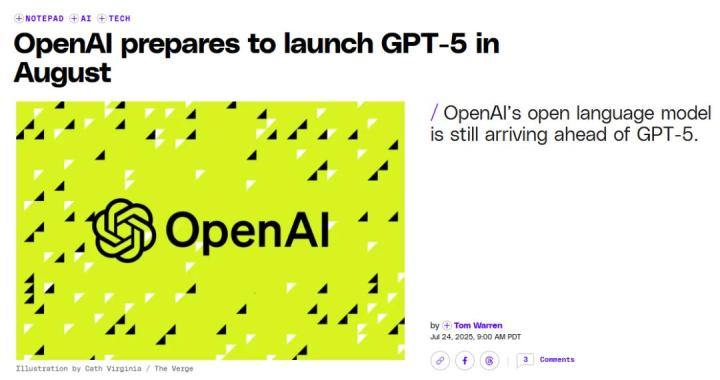On July 24th, after tracking for 12 months and based on massive ChatGPT user data, a team led by OpenAI's Chief Economist Ronnie Chatterji recently released an in-depth report titled "Unlocking Economic Opportunity", revealing AI's enormous potential for economic growth.
The Fastest-Growing Consumer Application in History
The report states that ChatGPT's rise is a miracle in tech history. It reached 1 million users in just 5 days, surpassed 100 million users within 2 months, and now has over 500 million global users.
This unprecedented user growth directly reflects its widespread penetration in work scenarios. Data shows that the percentage of working adults using ChatGPT in the US has surged from 8% in 2023 to 28%.
Every day, global users send over 2.5 billion messages to ChatGPT, with US users contributing 330 million messages daily. This explosive interaction volume provides OpenAI with a unique perspective to observe AI's real economic impact.
Currently, in the US, ChatGPT's primary usage scenarios include supporting learning and improving written communication skills, accounting for 20% and 18% of all US messages respectively.
Combining its broad application scenarios, continuously rising adoption rate, and free usage, ChatGPT has become not just a tool, but a key driver of personal productivity and an important indicator of AI's macroeconomic impact.
OpenAI's report deeply analyzes the driving forces behind ChatGPT's adoption surge and assesses AI's potential contribution to US economic growth using ChatGPT dialogue data from the US, economic research, external surveys, and predictions.
Even general technologies like electricity and steam engines took decades to be widely adopted and generate significant economic benefits. Yet ChatGPT reached 100 million monthly active users just two months after its release.
In just two years, ChatGPT's proliferation speed has reached twice that of the internet! By 2024, half of American adults have personally experienced AI products.
Three Core Drivers of Generative AI's Explosive Growth
The report outlined three core reasons for generative AI's "wild growth":
• Easily accessible experience: With a blank box and a prompt, AI tools can seamlessly integrate into personal or work processes, addressing pain points directly.
• Low barrier, high scalability: Companies like OpenAI offer free versions, making AI experience accessible. Once users discover its value, expanding usage becomes effortless.
• Boundless application scenarios: From gaming entertainment to cooking creativity, from data analysis to brainstorming, ChatGPT's application scenarios are astonishingly vast! Users immediately perceive its enormous potential upon first use.
The report suggests that this remarkable proliferation speed signals an inevitable future where AI significantly enhances global productivity. While economists disagree on specific growth rates, one consensus emerges: AI's impact on economic growth will be disruptive.
AI Usage Dominated by Young People: Over 30% in 25-34 Age Group
Millions of Americans have integrated ChatGPT into their daily and professional lives. What are they using it for? According to the report's survey:
• Learning and Skill Advancement (20%): Students, workplace professionals, and small business owners view ChatGPT as a personalized tutoring tool, quickly mastering new concepts.
• Writing and Communication (18%): Professionals can generate emails, marketing copy, and compliance documents in minutes, reallocating cognitive resources to more valuable creative tasks.
• Programming, Data Science, and Mathematics (7%): From professional code experts to programming novices, they rely on GPT models to generate template code, refactor existing code, and even debug complex algorithms.
• Other Potential Areas: Design and creative conceptualization (5%), business analysis (4%), translation (2%), etc., with AI's reach expanding everywhere.
Notably, ChatGPT's US user base shows a significant youth trend: a quarter (24%) are 18-24 years old, and a third (32%) are 25-34 years old.
This means a large group of AI natives are at the beginning of their career, bringing this AI expertise to shape workplace dynamics for decades to come.
AI's "Super Boost": Five Industries with Explosive Productivity
AI's initial economic benefits are concentrated in work tasks heavily dependent on language processing or pattern recognition, such as document scanning, blog writing, and customer Q&A. The report highlights five areas with particularly remarkable productivity improvements:
• Legal Services: OpenAI's models increased lawyers' productivity by 34% to 140% across six legal workflows.
• Customer Acquisition and Support: AI tools make reaching and supporting customers unprecedented. Call center employees using OpenAI models increased customer query response productivity by an average of 14%.
• Consulting Industry: Consultants using OpenAI's GPT-4 improved work efficiency by 25%, increased task volume by 12%, and enhanced work quality by 40%.
• Government Services: In a year-long Pennsylvania government pilot project, staff using ChatGPT saved an average of 95 minutes daily, covering document drafting, research, and IT support.
• Education: AI helps teachers save nearly 6 hours weekly, previously spent on lesson planning, providing feedback, and modifying classroom materials.
These industry transformations clearly demonstrate AI's potential to enhance productivity, save time, and improve work quality.
The "Golden Age" of AI Entrepreneurship Has Arrived
The report mentions that AI can significantly reduce startup costs and create new business opportunities! AI helps new companies scale faster and launch AI-enhanced products at lower costs. OpenAI CEO Sam Altman noted: "This might be the best time for entrepreneurship since the internet era, possibly in tech history."
In fact, Silicon Valley's renowned startup incubator Y Combinator is growing at an unprecedented rate, increasing about 10% weekly. This is partly due to the rise of "AI-first" startups. Currently, about 40% of small businesses report using AI.
Even in AI application's early stages, ChatGPT's breadth and impact in American lives are evident. Preliminary evidence suggests AI perfectly complements human work, acting as a "multiplier" of human capital and accelerating innovation.
OpenAI concludes by highlighting the challenge: How can we ensure AI's enormous benefits are fairly distributed to everyone, not just early adopters? This will be the shared question of the AI era.
This article is from "Tencent Technology", authored by Jin Lu, published by 36Kr with authorization.







